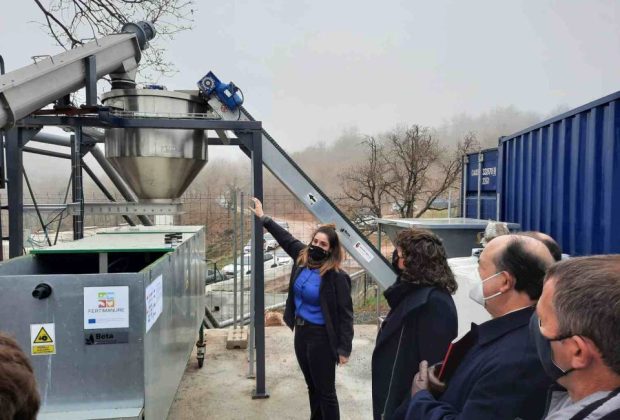Inauguration of the pilot plant of the FERTIMANURE project in Muntanyola, Osona
The event was attended by the Minister of Climate Action, Food and Rural Agenda (DACC) of the Generalitat, Teresa Jordà

Livestock farming is a major economic activity in the European Union (EU) and the one that makes the greatest use of land, either directly or indirectly. European livestock farms produce 1,400 tonnes of manure, of which only a very small fraction ends up being processed and the rest is applied to agricultural land as fertiliser, causing a strong environmental impact. To help reverse this situation, the European project Fertimanure (Fertilizers from animal manure) is being developing, evaluating and validating innovative strategies to manage nutrients and recover mineral nutrients from livestock manure to produce reliable and safe fertilisers. The Fertimanure project, coordinated by the BETA Technology Centre of the University of Vic – Central University of Catalonia (UVic-UCC), has a budget of 8.4 million euros funded by the European Union’s Horizon 2020 programme and involves a total of twenty partners from the EU, Argentina and Chile.
Fertimanure was launched on 1 January 2020 and is scheduled to end on 31 December 2023. During these four years, one of the most important phases is the creation of five pilot plants located in different European countries: France, Belgium, Germany, the Netherlands and Spain. The pilot plant in Spain, which began operating a few months ago, is located on the Cal Ros farm in Muntanyola (Osona), belonging to the Cooperativa Plana de Vic, and is the first-of-its-kind biorefinery to be implemented on a farm in Spain. The plant was inaugurated this morning in the presence of the Catalan Minister for Climate Action, Food and Rural Agenda (DACC), Teresa Jordà, whose department is also a partner in the project; the rector of UVic-UCC, Josep Eladi Baños; the president of the Cooperativa Plana de Vic, Andreu Fabré; the director of CT BETA, Sergio Ponsá, and the deputy director of the centre and coordinator of the Fertimanure project, Laia Llenas.
At the opening ceremony, Teresa Jordà, addressed “a very intense thanks” to all the people and entities that have made this pilot plant possible: “It is a sign that when complicities are woven together, very good results come out”. Jordà also stressed that the research of CT BETA and, more specifically the Fertimanure project, is closely linked to the interest of his ministry in the bioeconomy and the circular economy. “This project moves the livestock sector towards the circular economy, which not only has an environmental sustainability aspect, but also an economic and social one,” she said.
The head of the DACC emphasised the need to seek solutions to the problem of manure in Catalonia’s high-intensity livestock farming areas. However, the councillor stressed that “the agri-food sector does and wants to do things even better and we must destigmatise it”. For this reason, a transformation of the present is necessary to face the challenges of the future with guarantees. The Catalan Minister commented: “We need to reconnect with the territory and we do so with a temple of the territory, such as the UVic-UCC”. Jordà ended his speech by saying that “this project is now a pilot plant, but we must spread it throughout the territory, as the agri-food sector has many possibilities”.
The rector of the UVic-UCC, Josep Eladi Baños, stressed the importance of a European project like this being led from Vic and from Catalonia, and highlighted the practical and applied aspect of Fertimanure, since “it is not always possible that the results of the research carried out in the laboratory can be applied to solve specific problems”.
Laia Llenas, deputy director of BETA TC and coordinator of the Fertimanure project, explained the main characteristics of the project, “the most important in livestock waste in Catalonia”, in which twenty organisations are participating. Llenas referred to the headache that slurry has been causing for years, especially in areas such as the county of Osona. “The large excess of nutrients has been one of the most relevant problems in our territory and with the Fertimanure project we want to stop seeing it as a problem and see it as a resource of great added value, because the excrement can be a safe source for making biofertilisers”, explained Llenas. The deputy director of CT BETA closed her speech hoping that this is the beginning of many other projects on the transition to the circular economy.
